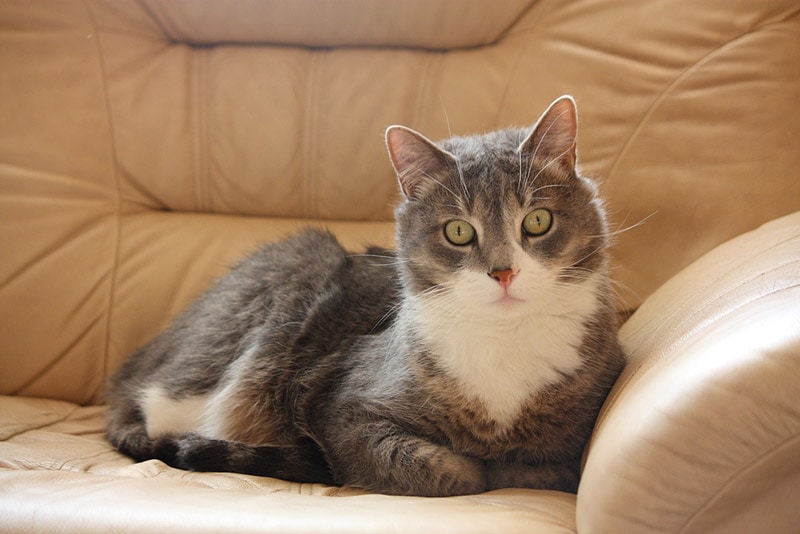Can Cats Eat Chicken Feet? Vet Approved Facts & FAQ
By Kit Copson
Updated on

Click to Skip Ahead
Many cats love to eat chicken, whether it’s the main ingredient in their commercial cat food or a bit of cooked chicken as a treat, but what about chicken feet? Cats can technically eat chicken feet but only as a snack and under supervision.
You should know, however, that there are potential risks involved, especially since chicken feet are often fed raw. There’s a lot to weigh up before deciding whether or not you want to feed chicken feet to your cat, so read on to learn all the facts.
Are Chicken Feet Safe for Cats?
Chicken feet are commonly sold as snacks for cats and dogs in both raw and dried form, and many cats enjoy digging into them now and then. However, cat lovers and experts are sure to have different opinions on whether they’re truly safe or not because feeding bones and raw meat are controversial topics. To help you decide if it’s something you’re comfortable with for your cat, here are all the facts and risks.
While some say they regularly treat their cats to chicken feet without any problems, others may be worried about the choking hazard of the bones and the presence of raw meat. This is a tricky issue because, if a cat eats bones, they should be raw and not cooked, as cooking can cause the bones to splinter, increasing the chances of your cat choking or experiencing digestive tract damage and obstruction. Even uncooked, though, bones could get stuck in the digestive tract or throat.
On the other hand, raw meat is controversial because of the bacteria and parasites it often contains. The FDA alerts pet owners to the risk of foodborne illness from bacteria like salmonella and listeria1.
In short, some people have had a good experience feeding their cats chicken feet as treats, whereas others may not be comfortable doing so for the reasons mentioned. If you choose to feed chicken feet to your cat, scroll down to the information on how to feed them as safely as possible.

Are There Any Benefits to Feeding Chicken Feet to Cats?
As far as we know, there haven’t been any studies conducted on this, but it’s possible that there are certain health benefits. Chicken feet contain collagen, and this can be beneficial for the joints, bones, skin, and heart health in humans, so it might be good for cats, too. They also contain glucosamine, which can contribute to joint health. However, there are many safe joint supplements continuing glucosamine formulated for cats available, speak to your vet for recommendations if you think your cat would benefit from one.
In addition, some proponents say that raw bones (never cooked) can help keep a cat’s teeth clean, but, as mentioned above, bones present a choking hazard, so you should exercise caution. In addition, giving your cat a bone to chew on is no substitute for brushing daily with a formulated cat toothpaste and feeding a healthy diet.
Do Cats Need to Eat Chicken Feet?
No, not at all. Your cat’s regular, complete, and balanced food formula takes care of all their nutritional needs, so it’s not necessary to supplement this with treats. There’s absolutely nothing wrong with treating your cat to some kitty-appropriate snacks now and then, but there are safer options than chicken feet, including pieces of thoroughly cooked chicken, turkey, beef, or fish without the bones.

How to Feed Chicken Feet to Cats
If your latest pet store haul included some chicken feet, here are some safety tips to remember:
- Never offer cooked bones to cats, as this could choke them or cause a dangerous obstruction.
- The minimum bone size is about the same as your cat’s head, as this helps reduce the choking risk.
- Don’t let your cat eat chicken feet if they have broken teeth.
- Don’t let your cat eat chicken feet if they have missing teeth.
- Cut off the nails if the feet come with these still attached.
- Don’t add any seasonings to the chicken feet.
- If the chicken feet have a foul odor or simply look off, don’t let your cat eat them.
- Only feed a chicken foot now and again, not every day.
- Always supervise when your cat is eating chicken feet.
Alternatives to Chicken Feet
Understandably, some cat parents are not at ease with the idea of feeding foods containing bones or raw meat. Safe “human food” alternative treats include:
Note: These foods should be offered plain with no extra oils or seasonings. Only feed them in small amounts, not as a main meal.
- Cooked, boneless meat (chicken, turkey, salmon, etc.)
- Cooked eggs (scrambled or boiled)
- Oatmeal
- Bananas
- Strawberries
- Blueberries
- Pumpkin
- Cooked rice

Final Thoughts
Taking everything into account, although cats can technically eat chicken feet and though they’re commonly sold as treats, there are healthier and safer alternatives you could offer. To reiterate, always supervise your cat if you let them snack on bones, and keep an eye out for signs of illness if their snacks contain raw meat. If your cat has dental issues, please speak to a vet before offering chicken feet.
See also:
- Can Cats Eat Chicken Gizzards? Vet-Approved Facts & FAQ
- Can Cats Eat Chicken Skin? Vet-Approved Facts and FAQ
Featured Image Credit: falco, Pixabay











